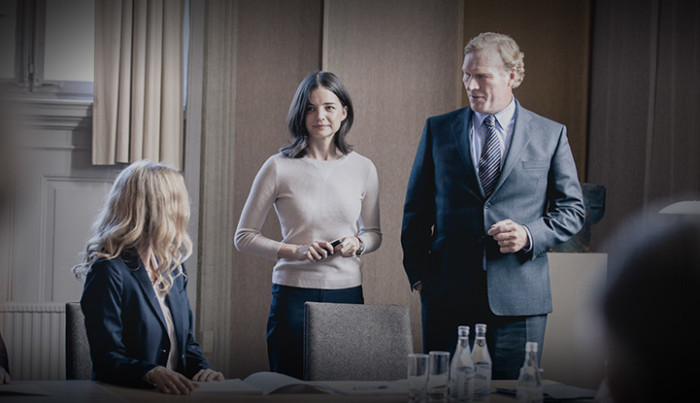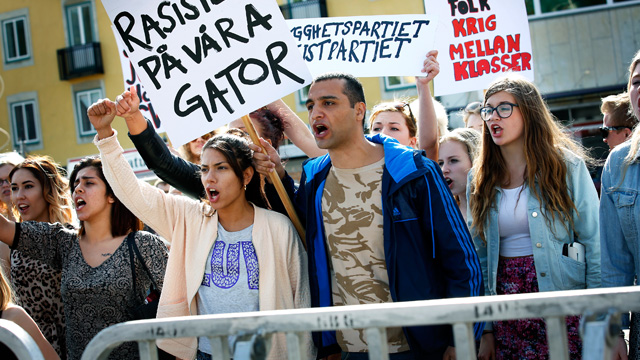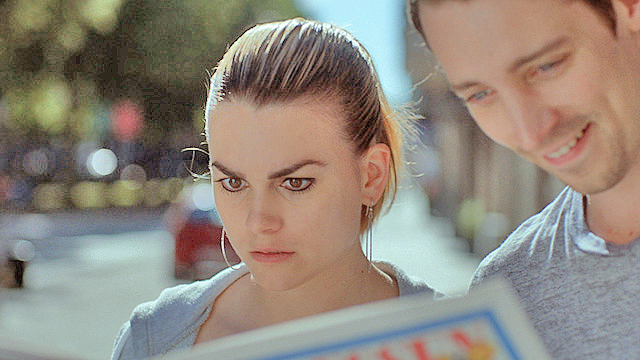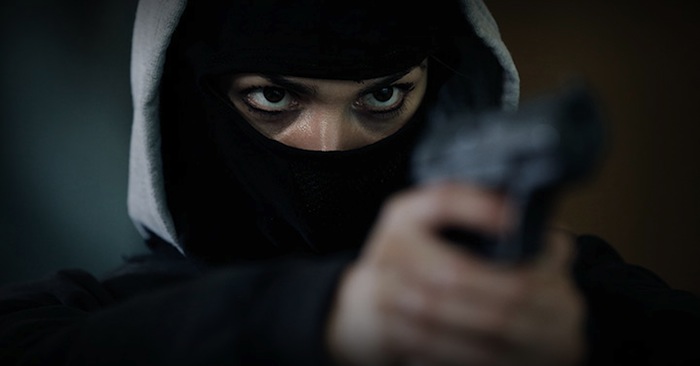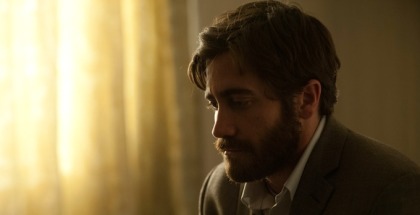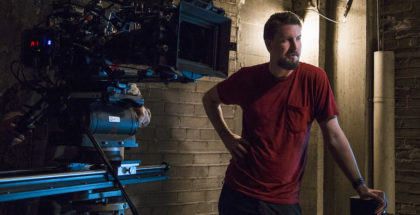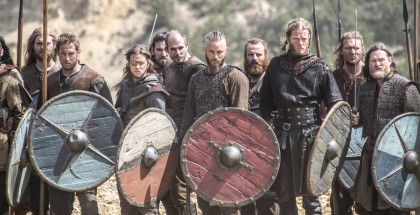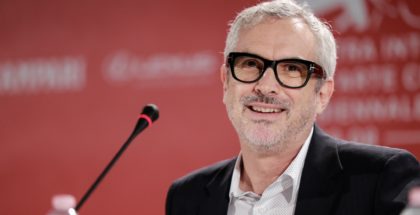Interview: How Blue Eyes writer Alex Haridi predicted the future of politics
David Farnor | On 24, Mar 2016
Read our spoiler-free review of Blue Eyes’ first two episodes here.
In 2010, Sweden Democrats became the first far-right political party to win seats in Swedish parliament. The party took 20 seats in the country’s general election – something that Alex Haridi, writer of the TV series Blue Eyes, describes as a “really big shock”. Sweden, which is perceived by both other countries and by its own people as a tolerant, moral nations, had tapped into another sentiment apparently lurking beneath the surface.
It was at that point that Haridi began to write the thriller Blue Eyes, which premieres on Friday 25th March in the UK.
“The series spun out of a ‘What if?’ question,” he explains to us. “Sort of like ‘What if the movement continued and what could that lead to?’ And at the point of conception, it was almost… like a science fiction show.”
Since then, though, it’s become more and more like a documentary. A poll at the end of 2015 found that one in five Swedish people would be prepared to vote for Sweden Democrats, as the right-wing party continues to gain ground.
“It was very weird,” comments Alex. “During the development and writing and shooting, reality just kept getting closer and closer to the series. To the point that when it aired, I remember reading something on Twitter, someone who wasn’t terribly impressed by the show was like ‘Oh, there’s no art. All they did was read the newspaper this morning and throw it up on the television’ and I was like, you have no idea! It’s the equivalent of throwing up 2021’s newspaper [on the screen now].”
It’s not the first time that TV has anticipated the rise of such politicians, though, or at least those who can channel the anti-establishment sentiment rippling through many societies. 16 years ago, The Simpsons predicted (in “Bart to the Future”) that Donald Trump would be elected President of the United States. In the UK, meanwhile, UKIP have grown in popularity in recent years, with their nationalist rhetoric again appealing to those disenchanted with the status quo and buying into the notion that foreigners are to blame. The rise of populist right-wing politics is happening across the developed world, with more and more parties using the financial crisis and tough economic times to make immigrants and poor people scapegoats. In June this year, the Conservative Party government is even holding a referendum on Britain’s membership of the EU to quell supporters who might have otherwise jumped ship to UKIP.
If that sounds like a heavily political paragraph, it’s because these are the issues that Blue Eyes delves into. The series begins in the run-up to an election, with far-right party Trygghetspartiet enjoying expanding support, having distanced itself from associations with neo-Nazis (much like the Sweden Democrats in real life). This support is much to the chagrin of key party member Annika’s son, Simon. Meanwhile, a key figure in the government has gone missing in mysterious circumstances and an extremist terror group is starting to carry out planned attacks.
“During the writing, reality just kept getting closer and closer to the series.”
For all its conspiracies and conflict, though, the show manages to tread a brazenly even-handed line.
“We did get criticisms from both the extreme right and the extreme left, which was quite interesting,” notes Alex, who says he took a staunchly balanced stance throughout. He even refuses to answer our question about whom he voted for in 2014 (“although I think you can probably guess from the fact that I was shocked back in 2010”).
“I really don’t like drama that comes off as propaganda,” he explains. “I wanted the audience to form their own opinion. And I don’t think that showing softer sides to people who do bad things justifies what they’re doing.
“I wanted Blue Eyes to be a conversation piece. I wanted people to talk about it. I honestly don’t think that art or TV or drama can change people’s opinions. The only thing that can change a person’s opinion is things that happen to them in their everyday life. But what I do think drama can be is a conversation starter.”
Was he worried about offending either side of the debate, or being misinterpreted by certain parties?
“To a point,” says Alex. “Other people worried about that, like the network and the production company.”
In fact, in Sweden, Blue Eyes aired on the public service network, so it was supposed to carry a certain amount of impartiality. Within an hour of the first episode airing, the programme broke the record for the most ever complaints received by a drama.
“We were cleared on all accounts,” clarifies Alex, who remains confident in his creation.
“The moment before I committed to the production, I worried whether I should do it. ‘Am I going to have get a secret address? Will I have to leave Twitter now?'” he laughs. “Then I decided that if I was going to do it, I was going to go all the way and do it the way I felt it should be done. So I didn’t doubt myself during the writing much, because I had this very clear vision.”
One of the key figures to establishing the show’s ambiguity is Sophia (Karin Franz Korloff), the daughter of Annika. As she finds herself wrestling with her mother’s political legacy, her dilemma helps us to see the political spectrum from both ends.
“That character was integral for the whole conception of the show,” agrees Alex. “For me, after I sort of decide on a concept, I need to find the emotional core of what I’m writing and for me, the emotional part of Blue Eyes – there are lots of different threads – but my way into it was the relationship between the two siblings [Sophia and Simon]. That was where I could see and feel the show and where I could hear the show.”
“When I started writing [Blue Eyes] in 2010, I had never heard of UKIP…”
Annika’s colleague is Olle Nordlof, a right-wing Swedish politician with bright eyes and tousled blonde hair, not entirely unlike Boris Johnson. The vague likeness is entirely coincidental – Alex is only familiar with the Mayor of London from a few mentions of him in the Swedish news – but it highlights once more just how universal the themes of Blue Eyes are. The secret to predicting the political landscape six years in the future? For Alex, it was a case of looking to the past and analysing trends involving similar movements in history around the world.
“It’s not localised to one European country,” he comments of the current shifting landscape. “It’s a movement, just as you said, through all the developed world and we’re just at varying degrees of where we started our development. When I started writing [Blue Eyes] in 2010, I had never heard of UKIP and it was shortly prior to us shooting that they had this enormous… local election, I think it was.” (UKIP secured its first ever elected MP in 2014 during the Clacton by-election, which saw Douglas Carswell defect from the Tories to win the popular vote.)
That universality, though, has also paved the way for the show’s success outside of Sweden.
“I’ve seen it in reception of the show in different parts of Europe,” continues Alex. “At first, I thought it was going to be a super local show and it wasn’t going to be interesting to anyone outside of Sweden! And then I get to Germany and I get to Paris and now London, and all around, everyone is relating to it.”
The show is guaranteed to be a hit on Walter Presents, Channel 4’s online channel devoted to foreign-language TV, where it will join programmes from the likes of Switzerland, Denmark and Germany.
It’s ironic, I point out, that the UK should be holding a referendum about leaving the EU just as it’s enjoying more and more of European television. Alex laughs.
How much UK TV goes the other way and makes it into Swedish living rooms?
“We get a lot of British television – we love British television,” enthuses Alex. “The last thing I saw was London Spy, but we get all the Midsomer Murders and all those BBC mini-series, like War and Peace.”
“It’s a really exciting time to be a writer in Swedish television at the moment.”
It may not seem like a fair trade: Sweden gives us Wallander and The Bridge and we give them Midsomer Murders. But Alex is grateful for growing international interest in Nordic TV.
“I owe a debt of gratitude to the whole Scandi crime wave,” he says, “What this whole wave of interest has done is give us a bit of leeway in pushing the envelope in the shows we’re doing. It’s a really exciting time to be a writer in Swedish television at the moment.”
It helps that Blue Eyes is different, he adds.
“It’s not the standard [show] where you have the slightly antisocial alcoholic detective… it doesn’t follow that structure!”
As for the Walter Presents release, he’s already fully on board VOD, with both Netflix and HBO Nordic accounts on the go – the last thing he streamed, he tells us, is first season of Marvel’s Daredevil.
“I love watching online,” he remarks. “I rarely ever watch television on a sort of broadcast schedule anymore.”
The growth of video streaming has also opened up opportunities for series such as Blue Eyes to find audiences overseas.
“As a creator, it’s amazing if shows from Scandinavia manage to reach out and build a following across the world. Maybe there’s an opportunity to do more niche shows. Like maybe there are only 2,000 people in Sweden who are interested in this, but it doesn’t matter, because there are 4,000 in Britain and 5,000 in France…”
With its gripping cliffhangers and intelligent grasp of modern politics, Blue Eyes certainly deserves to find a wide audience – but will there ever be a second season?
“It’s in early development,” reveals Alex. “I’ve written a five-page outline of the themes and stories that would be covered, but I’m really not rushing into it because I feel like I went for broke with Season 1 and I really didn’t hold back. If Season 2 happens, I want it to be because there’s a story that’s as important to tell as the first season. We’re in early negotiations.”
Blue Eyes premieres on More4 at 9pm on Friday 25th March, with episodes broadcast weekly – and then available to catch up with afterwards for free on All 4’s Walter Presents. For more on what else is new and coming soon to Channel 4’s foreign-language VOD service, click here.
All photos: ZDF Enterprises


